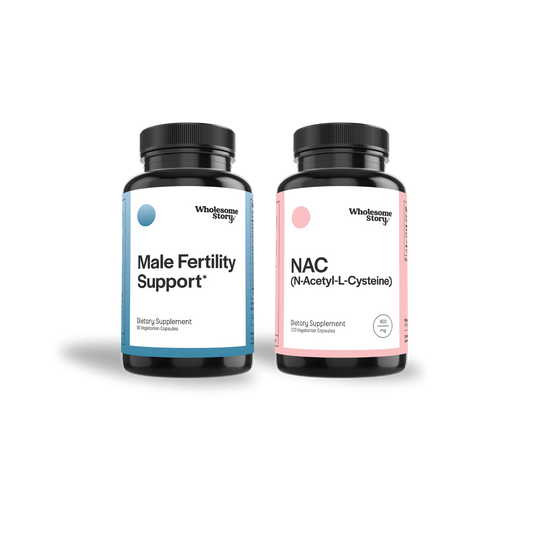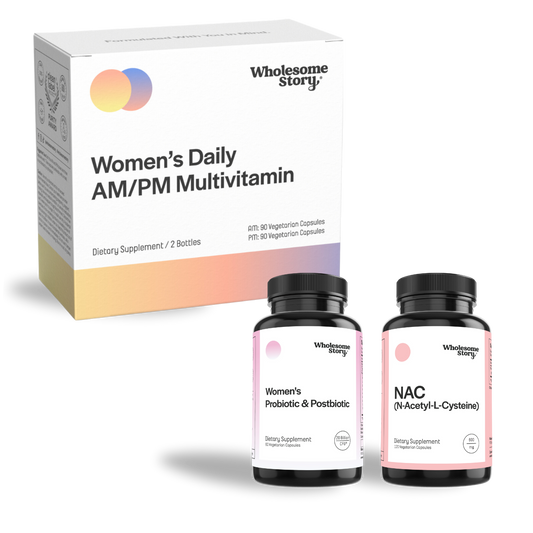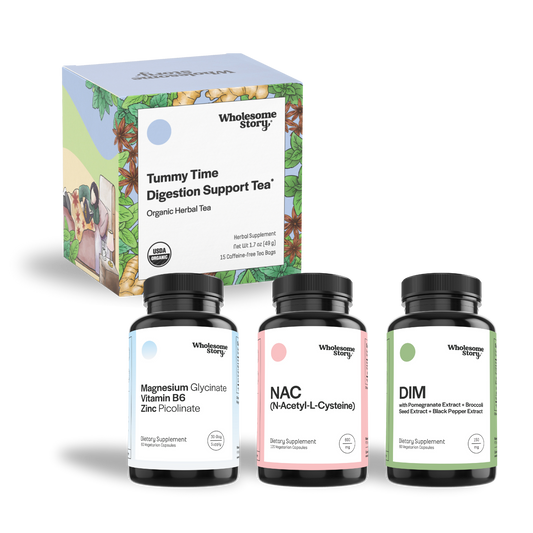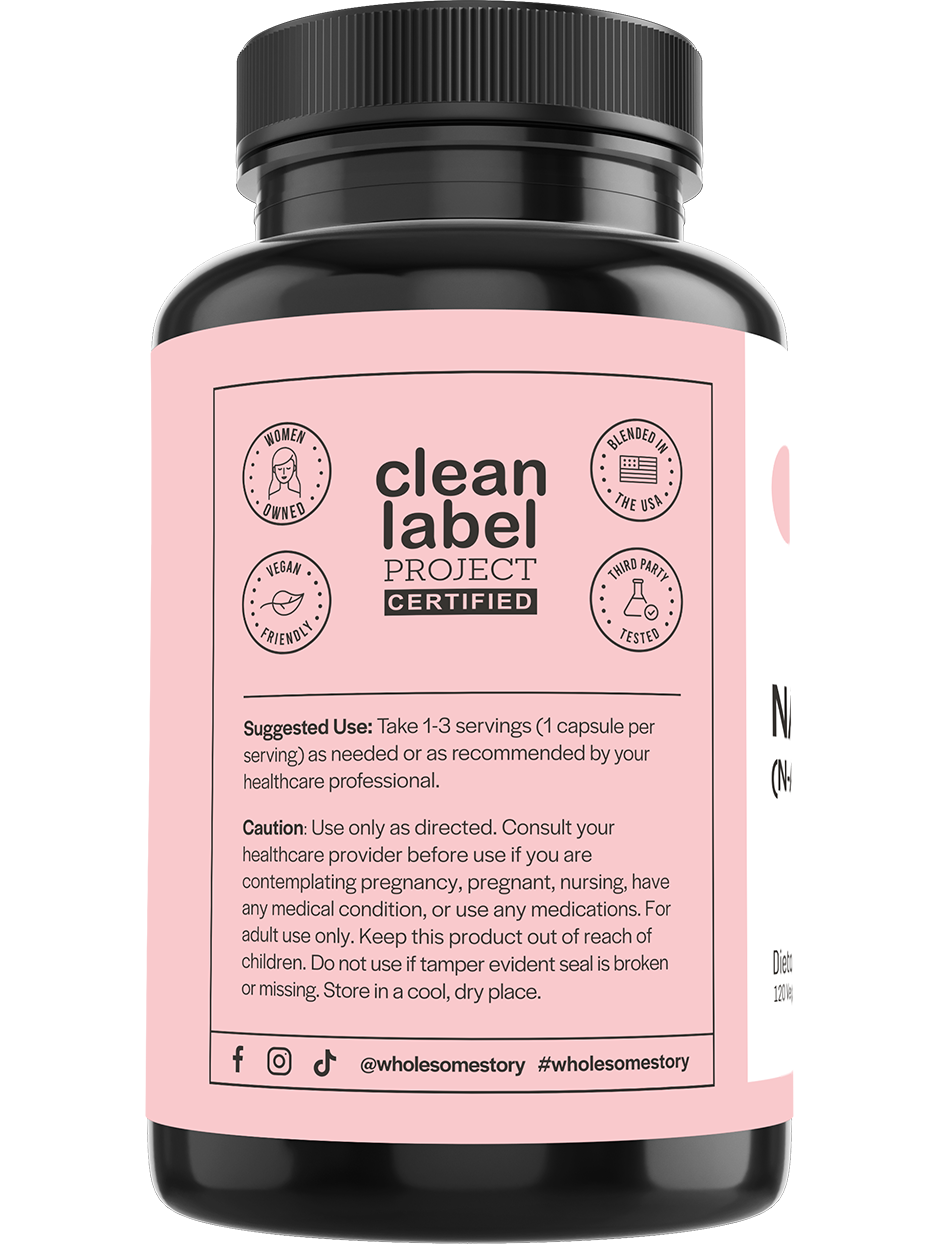
Bundle & Save Up To 15%
Powerful Antioxidant Support
Supports Your Organs and Tissues:
NAC is the precursor to glutathione, a powerful antioxidant that helps to scavenge free radicals which cause damage to cells. NAC can help to keep our bodies functioning properly by protecting our organs at a cellular level from chemical stressors.
Safe and Supportive:
NAC is a naturally occurring antioxidant within the human body and supplementing with it at our recommended dose is a safe way to support organ and tissue health during almost any time of life, including pregnancy.
Supports Full-Term Gestation:
Clinical trials have demonstrated that, due to its powerful antioxidant effects, NAC supplementation can support full-term gestation in certain women, thereby supporting a healthy, natural pregnancy for mother and baby.
NAC Smell Disclaimer:
Please note that high-quality NAC naturally has a sulfurous smell and that this does not indicate spoilage or contamination.
Take 1-3 servings (1 capsule per serving) as needed or as recommended by your healthcare professional.
Supplement Facts
Serving Size: 1 Capsule
Servings Per Container: 120
Amount Per Serving %DV
N-Acetyl-L-Cysteine (NAC; Free-form): 600mg**
**Daily Value (DV) not established.
Other Ingredients: Methylcellulose (Capsule), Rice Flour.
N-Acetyl-L-Cysteine (NAC; free-form)
Powerful antioxidant for supporting organ health, reproductive health, and full-term gestation.*
Methylcellulose Capsule
Methylcellulose Capsule - Vegan-friendly capsules made from plants.
Non-GMO Rice Flour
Non-GMO Rice Flour - Just a teensy bit to help the powder flow into the capsules more easily.
Use only as directed. Consult your healthcare provider before use if you are contemplating pregnancy, pregnant, nursing, have any medical conditions, or use any medications. For adult use only. Keep this product out of reach of children. Do not use if tamper evident seal is broken or missing. Store in a cool, dry place.
Please use caution when taking this product if you have a history of any bleeding or clotting disorders, or if you are taking any other supplement or medication that may have anticoagulant or antiplatelet effects, as this combination may increase the risk of bleeding.
- https://pubmed.ncbi.nlm.nih.gov/6340205/
- https://pubmed.ncbi.nlm.nih.gov/18851855/#:~:text=The%20discontinuation%20rate%20was%2011.4,in%20patients%20with%20bacterial%20vaginosis
- https://pubmed.ncbi.nlm.nih.gov/18983759/
- https://pubmed.ncbi.nlm.nih.gov/23731375/
- https://link.springer.com/article/10.1007/s40264-020-01026-y?fbclid=IwAR1t5utGgSc8nZTgUiAhLwh3BuJux9oJGszION8xuTSayNqEk3UgegzIt2c#ref-CR11
- https://www.tandfonline.com/doi/full/10.1080/10715762.2018.1468564
- https://onlinelibrary.wiley.com/doi/10.1002/brb3.208
- https://www.mdpi.com/1420-3049/23/12/3305/htm
- https://pubmed.ncbi.nlm.nih.gov/19621836/
- http://clevelandclinic.org/reproductiveresearchcenter/docs/agradoc162A.pdf
- https://www.sciencedirect.com/science/article/abs/pii/S0306987712001405?via%3Dihub
- https://www.ncbi.nlm.nih.gov/pmc/articles/PMC4744393/
- https://www.dovepress.com/update-on-the-pathological-processes-molecular-biology-and-clinical-ut-peer-reviewed-fulltext-article-COPD
- https://www.ncbi.nlm.nih.gov/pmc/articles/PMC4531779/
- https://www.ncbi.nlm.nih.gov/pmc/articles/PMC2967178/
- https://www.ncbi.nlm.nih.gov/pmc/articles/PMC3844587/
- https://www.hindawi.com/journals/bmri/2018/2469486/
- https://www.tandfonline.com/doi/full/10.3109/15412555.2014.898040
- https://www.rbmojournal.com/article/S1472-6483(09)00289-2/fulltext
- https://www.fertstert.org/article/S0015-0282(02)03133-3/fulltext#secd46190485e837
- https://www.ncbi.nlm.nih.gov/pmc/articles/PMC3411859/
Shipping & Returns
We offer a full refund on the purchase price minus shipping of our supplement products any time within 90 days (up to 3 bottles full or empty) for orders shipped in the United States. To process a refund, please email us using our Contact Us page for instructions on returning the bottles.
Customers are responsible for the return shipping cost. Once your return is received and inspected, we will send you an email to notify you that we have received your returned item. A credit will automatically be applied to your credit card or original method of payment, within 7 business days.

Still in doubt?
Try for 90 days first.
-
Why does my NAC smell like rotten eggs?
NAC naturally has a sour, suphury smell that many people describe as "rotten eggs". Not all NAC supplements smell this way, only the good-quality ones do. Our NAC is very high-quality, and therefore rather pungent. -
Is your NAC good for men too?
Yes! Because NAC helps to fight free radicals that can disrupt testosterone and depress organ/tissue health, it can help men by supporting healthy hormone balance, fertility, and organ health. It's not a sexist molecule. -
Is your NAC safe to take while pregnant?
NAC is safe for most pregnant women and their babies, and it can even support full-term gestation. However, as every body and situation is uniqe, we recommend you speak with your healthcare provider before adding NAC to your routine, especially if pregnant or nursing. -
Is your NAC safe to take while nursing/breastfeeding?
Our NAC is safe for most women while nursing/breastfeeding. However, you should always consult your healthcare provider before introducing any new supplement to make sure it's a good choice for your individual situation, especially when nursing or pregnant. -
Is your NAC safe to take while on birth control?
Yes, NAC is generally safe to take alongside hormonal birth control, but you should check with your healthcare provider about it and make sure they approve of the addition before you start taking it. -
Can I take other supplements at the same time as NAC?
NAC is safe to take with most other supplements. However, you should always check with your healthcare provider before adding a new supplement to your routine. -
Is there a limit on how long I should use the NAC?
We cannot advise you on how long to take NAC since the reasons you're taking it will likely impact how long you continue taking it. Some individuals take it for years and others stop after a few weeks or months. It's best to speak with your doctor to determine what would be best for your body. -
Is your NAC free of soy, gluten, dairy, eggs, and other allergens?
Our NAC contains no animal products, gluten, soy, or nuts. The only ingredients are the NAC, a plant-based capsule made of methylcellulose, and a tiny bit of rice flour for easier processing & digestion. However, our products are made in a facility that also processes common food allergens.














